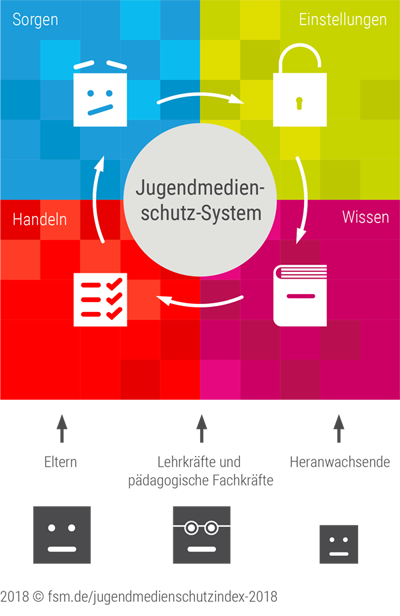Youth Media Protection Index 2018 published
Homework books, lunch boxes, smartphones - the digitalization of children and young people has long since reached the schoolyard. But what role does youth media protection play in Germany's schools? And how well prepared are teachers and specialist educators to protect the adolescents they supervise from negative surfing experiences?
The results of an explorative study by the Voluntary Self-Monitoring of Multimedia Service Providers (FSM e.V.) and the independent research institutes Hans Bredow Institute for Media Research and JFF - Institute for Media Education in Research and Practice, are worrying: only 50 percent of the teachers and specialist educators surveyed are confident that they can support or advise children and young people in dealing with online risks - even their own skills in the world of online media are only rated slightly better.
Yet teachers in Germany are anything but carefree: more than half of those surveyed said they were worried about problematic online content; one in three teachers believes that online use has negative personal consequences. They cite contact with strangers, disturbing violent or pornographic content, cyberbullying, data theft, viruses and much more as specific risks. As many as 86 percent of teachers and specialist educators have already observed online bullying among their students, 84 percent are convinced that children and young people disclose too much data on the Internet, and 80 percent assume that students come into contact with content that is disturbing or frightening for them, such as violence, sex or horror.
Despite these pronounced concerns, around half of the teachers themselves see themselves as only partially capable of protecting the children and young people they work with from online risks; this indicates a considerable need for individual further training. The respondents see the responsibility to become active in youth media protection primarily with parents and the providers of online content, social platforms, messaging services and authorities; at 76 percent, schools are attributed somewhat less responsibility, but they are attested to largely fulfilling this responsibility. In contrast, only 19 percent believe that parents care enough about protecting their children online. Almost two-thirds (63 percent) of the teachers and specialist educators surveyed want to take on a more visible role in the future and inform parents about the opportunities and risks of online use. They see a great need for support and education, especially in the area of privacy, data protection and dealing with messengers (96 percent).
"According to the evaluation of the study, one of the reasons for the presumed lack of commitment lies in the media education framework concepts at schools - these are lacking at more than every second institution, according to the statement of the respondents," explains Martin Drechsler, Managing Director of the FSM. "In addition to the necessary framework concepts, more needs to be done in the area of further training," Drechsler continues. Because the study revealed: according to the teachers, the further training opportunities at schools were almost always voluntary. Only three percent were able to participate in mandatory continuing education measures. And only one in five knows about regularly offered advanced training courses.
Even in an acute emergency, the right information is often lacking, and teachers often reach for the wrong telephone number or send parents to the wrong address: 63 percent do not know of any specific complaints or advice center. According to Martin Drechsler, "Youth media protection is highly topical and urgent help is often needed, yet the contact options are not as well known as the emergency numbers 110 or 112." This is why children and young people sometimes end up at consumer protection or the data protection officer on the advice of teachers.
When asked about possible protection mechanisms, teachers and specialist educators consider technical restrictions to be sensible and not much of an obstacle when teaching or using online services. 77 percent consider safeguards and protective mechanisms on devices such as smartphones or tablets to be the right thing to do. A large majority of respondents (83 percent) rank the protection of children and young people higher than free access to all online offerings.
The FSM is the publisher of the study, which was conducted by the independent research institutions Hans Bredow Institute for Media Researchand JFF - Institute for Media Education in Research and Practice . The director of the Hans Bredow Institute, Prof. Dr. Uwe Hasebrink, advocates the further development of the youth media protection system: "The Youth Media Protection Index shows that parents, educators and also the adolescents themselves consider youth media protection to be an urgent task and that all players must cooperate in this. So far, however, those involved know far too little about each other: we need transparency about who is doing what in youth media protection."
Dr. Niels Brüggen, Head of Research JFF - Institute for Media Education in Research and Practice: "For the first time, this edition of the Youth Media Protection Index focuses on the contribution of schools and out-of-school educational programs to supporting children, young people and parents in dealing with online media and online risks. Prior training in media education has proven to be a key prerequisite for providing good support to families, although this is not yet the case across the board."
For more information on the Youth Media Protection Index, please refer to the study or the summary or go online to www.fsm.de/jugendmedienschutzindex.
(Source:FSMpress release| 06.11.2018)
- Download overall study (PDF)

